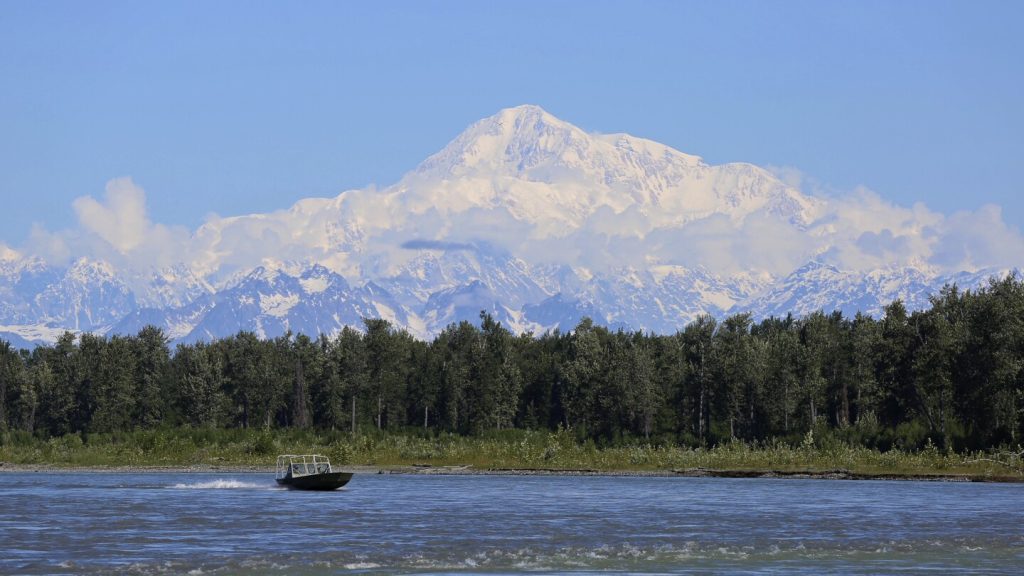President-elect Donald Trump has reignited a decades-old conflict by suggesting he wants to change the name of North America’s tallest mountain, Denali, back to Mount McKinley. Former President Barack Obama changed the official name to Denali in 2015 to honor the traditions of Alaska Natives and the preferences of many Alaska residents. The term “Denali” means “the high one” or “the great one” in Athabascan. In contrast, “Mount McKinley” was given by a prospector in 1896 after President William McKinley, who had never been to Alaska. Obama’s decision to change the name was met with opposition from lawmakers in McKinley’s home state of Ohio.
In 2016, Trump initially suggested he might revert the name back to Mount McKinley but dropped the idea after Alaska’s senators objected. However, during a rally in Phoenix, Trump brought up the topic again, praising McKinley as a “very good, maybe a great president” and expressing his desire to restore his name to the mountain. This proposal was met with swift opposition from Alaskans, with Democratic state Sen. Scott Kawasaki stating firmly that the mountain is Denali. Republican Sen. Lisa Murkowski, who had pushed for legislation to change the name to Denali, echoed these sentiments, emphasizing that there is only one name worthy of the tallest mountain in North America, and that is Denali.
The conflict over the name of the mountain has roots going back to the 1970s, when Alaska began requesting a name change. Since 1975, Alaska has been advocating for renaming the peak to honor its Indigenous heritage, as various tribes of Athabascan people have lived in the shadow of the mountain for thousands of years. Despite Ohio’s attachment to the name Mount McKinley, Alaska has consistently pushed for the recognition of Denali as the mountain’s rightful name. Denali’s majestic beauty, with its glaciers and perpetual snow cover, has attracted adventurers seeking to climb its imposing heights, despite the challenging conditions.
The disagreement over the name of North America’s tallest mountain reflects larger tensions between Alaska and Ohio, as well as broader debates about honoring Indigenous traditions and heritage. While some argue for the historical significance of the name Mount McKinley, others emphasize the importance of respecting and preserving Native culture by recognizing Denali’s traditional name. The federal government’s recent efforts to rename places deemed disrespectful to Native peoples signal a broader shift towards acknowledging and honoring Indigenous contributions and perspectives. As the debate over the mountain’s name continues, it highlights the complexities of balancing historical legacies with contemporary values and considerations.
The symbolic significance of renaming Denali goes beyond a simple change in label; it represents a broader recognition of Indigenous voices and histories in shaping the narrative of America’s landscapes. By restoring the mountain to its original name, Denali, there is an opportunity to honor and celebrate the cultural heritage of Alaska Natives and acknowledge the deep connection between the land and its Indigenous inhabitants. As discussions around the mountain’s name persist, it serves as a reminder of the ongoing efforts to promote inclusivity, diversity, and respect for diverse cultural perspectives in the United States. Ultimately, the debate over the mountain’s name encapsulates larger questions about identity, memory, and the complexities of navigating historical legacy in a changing world.
As the controversy surrounding Denali/Mount McKinley continues, it prompts reflection on the importance of acknowledging and preserving Indigenous traditions and histories in the broader context of American identity and heritage. The mountain’s name represents more than just a geographical feature; it symbolizes a complex web of relationships, memories, and narratives that shape our understanding of the land and its significance. By engaging in conversations about the name of Denali, we are engaging in a dialogue about the past, present, and future of America, and the diverse voices that contribute to its rich tapestry of cultures and experiences. Continued discussions and debates surrounding the mountain’s name offer an opportunity to explore these themes in depth, and to seek a deeper understanding of the complexities of our shared history and heritage.


